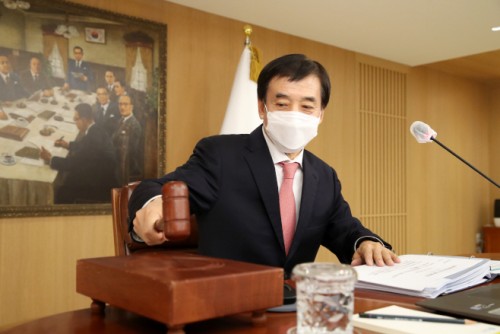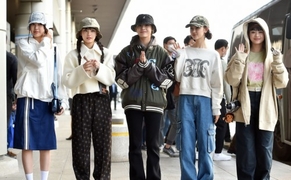 |
| BOK Gov. Lee Ju-yeol presides over a rate-setting meeting on Nov. 25, 2021. /Source: The Bank of Korea |
AsiaToday reporter Kim Yoon-joo
The Bank of Korea (BOK) raised its key policy rate Thursday by 0.25 percentage point to 1 percent, putting an end to 20 months of the policy rate staying in the zero range. BOK Gov. Lee Ju-yeol said the policy rate still remains “accommodative,” leaving the possibility for another rate hike in the first quarter of next year.
The BOK’s monetary policy board voted to lift the key interest rate by 0.25 percentage point to 1 percent. As a result, the base interest rate returned to the 1 percent level for the first time since February 2020, when the key interest rate stood at 1.25 percent. During the meeting, one member of the board, Joo Sang-yong, voted for freezing rates.
In August, the monetary policy board raised the interest rate to 0.75 percent from the previous 0.5 percent. However, it failed to curb price pressures. In fact, the country’s consumer inflation rose 3.2 percent in October from a year earlier, the fastest growth since January 2012 and far higher than the government’s target of 2 percent. This forced the central bank to raise the interest rate this year.
“The monetary policy board raised the rate, considering how the domestic economy is on the recovery track despite the global supply bottleneck, and that inflation is forecast to accelerate further than previously expected, raising the risk of financial imbalance,” Gov. Lee said. “The board will judge when to further adjust the degree of accommodation,” he added.
The central bank has also hinted at another possible rate rise in the near future as BOK Gov. Lee said the current 1 percent interest rate is still “accommodative.” The next meeting of the monetary policy board is scheduled for January 14, 2022. “The hike still appears to be accommodative given growth and price trends,” Lee said. “We should not rule out the possibility of another increase in the first quarter of next year.”
Experts also predicted an additional rate hike early next year. “They are expected to raise the current 1 percent base rate to the pre-pandemic level, which is between 1.25 and 1.75 percent,” said Kim Sang-bong, an economics professor at Hansung University. “We have to keep an eye on the economic situation as there are enough factors to raise the key interest rate further in the first quarter of next year.”
Some are concerned over fast-increasing household debt due to the rate hike. In fact, a 0.25 percentage point hike in the policy rate will result in an increase of 2.9 trillion won of household debt, according to central bank data.
Lee admitted that the rate hike could deepen interest payment burdens on many households. However, he expressed skepticism that the interest rate hike could contract consumption. “Consumption may be constrained due to a decrease in disposable income, but private consumption has recently rebounded rapidly thanks to the normalization of economic activity and expanded financial support,” Lee said. “The impact of rate hike is not expected to be much in general on private consumption.”
The central bank also released its revised economic outlook. The BOK kept its 2021 growth outlook at 4 percent, while predicting a 3 percent advance in 2022, unchanged from its August projections. It revised up its inflation outlook for this year to 2.3 percent from 2.1 percent forecast three months earlier and raised the projections for next year from 1.5 percent to 2 percent.
#central bank #interest rate #Bank of Korea
Copyright by Asiatoday
Most Read
-
1
-
2
-
3
-
4
-
5
-
6
-
7





















